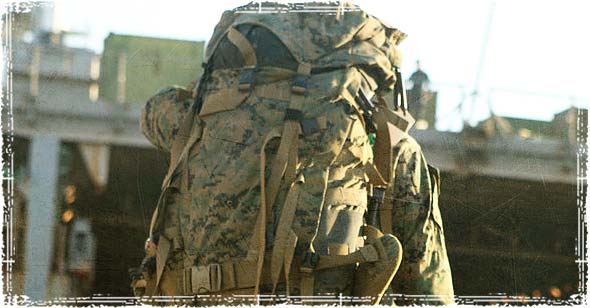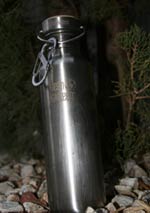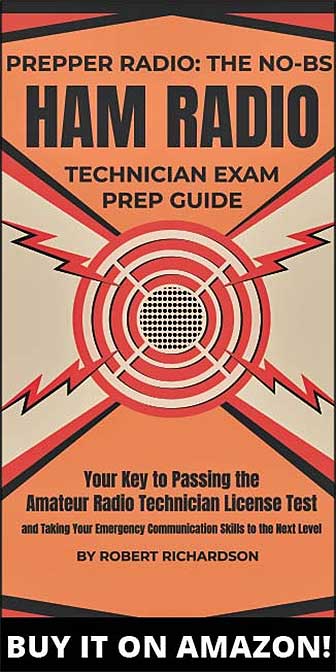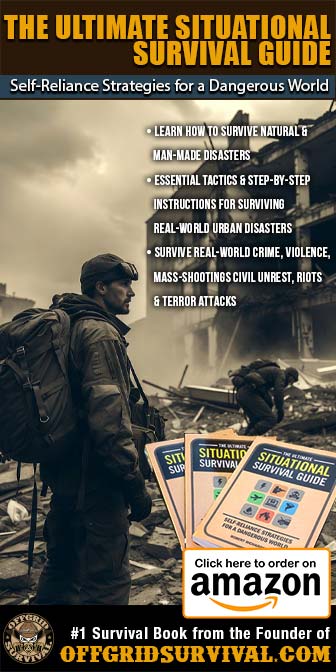Carrying a heavy backpack can be a real pain in the BACK!
The last thing you need in a bug out situation is to be carrying any unnecessary weight. When it comes to Bug Out Bags, I take a minimalist approach to what I carry, and tend to use a lot of lightweight hiking gear.
Six ideas to cut down the weight in your Bug Out Backpack

Break out the scale
When I’m light hiking, I rarely carry over 15 pounds of gear, including my food and water. It may sound a little crazy, but I actually calculate how much each piece of gear weighs on paper before I ever add it to my pack. Trust me, when you’re a couple days into a long distance thru-hike you will be wishing you would have put a little bit more thought into your packs weight.
Pick backpacking gear that is multipurpose
To cut your packs weight try to select gear that can be used in a number of situations. Items like Bandanas and tarps are great multipurpose pieces of gear that are not only lightweight, but can be used in a variety of survival scenarios.
Shed those ounces….
Ultralight hikers are notorious for going to extremes to shave off even a few ounces from their packs weight. From drilling holes in equipment to removing tags, patches and other emblems from their gear, light hikers will do just about anything to shed those extra ounces!
While some of the things they do may seem extreme, every little ounce eventually adds up.
Don’t forget the actual Pack!
One thing that’s often overlooked when trying to cut pack weight is the actual weight of the backpack. Ultralight backpacks have gotten so light that you can often shave over 5 pounds from your total weight, just by switching to an ultralight pack.
Ditch the tent
If you’re carrying a tent, you can cut your weight in half or more by switching to a tarp and hammock setup. While you can save even more weight by ditching the hammock, I like to carry one in certain areas of the country. They are a great for keeping you off the ground, and away from dangerous little critters.
Carry Less Water
 A gallon of water weighs over 8 pounds. When hiking, I try to carry the least amount possible without running the risk of dehydration. When planning your bug out or evacuation routes, make sure you map out as many watering holes as possible. Knowing where you can find water can help you cut down on a significant amount of water weight.
A gallon of water weighs over 8 pounds. When hiking, I try to carry the least amount possible without running the risk of dehydration. When planning your bug out or evacuation routes, make sure you map out as many watering holes as possible. Knowing where you can find water can help you cut down on a significant amount of water weight.
I usually carry a hiking water filter, one full canteen and one empty one. The empty one allows me the option of carrying extra water if I’m in an area where water is scarce. It also serves the dual purpose of being able to cook food, or boil water over a campfire.
The canteen that I use is made by Klean Kanteen and is pictured on the left. They are one of the most well-made canteens that I’ve found, and are a great multipurpose survival item to carry. Click here to check them out on Amazon.







These are all very good ideas. I recently went through my bug out bags with the purpose of removing stuff but ended up adding to them! While I’m still relatively young and healthy I am less concerned with content weight but it does cross my mind as an important consideration. I figure that if I decide I can’t carry my bag any longer I’ll figure out what I REALLY don’t need. :)
Big amens. Especially on the pack and the water. Although you don’t want to scrimp, these are 2 items that do rack up the pounds quickly.
Another component that may be equally as big is load distribution…
HOW and WHERE the weight is carried is almost just as important as how much.
My all time favorite pack for a BOB is the USMC ILBE Corpsman Assault Pack. Although not an ultra lightweight pack, the load distribution is incredible. Never felt a better pack–including hiking packs. And because it’s an assault pack, it sits high off your butt (waist vs. hip), allowing you to be able to run/manuever if necessary.
I had a platoon Sargent that said ” beware of lightweight gear, you might wind up with a hundred and fifty pounds of the stuff.” :-))
I must say I disagree with the admonition to go light on water..
Where do all predators hang to hunt? Watering Holes..
Where will many of the panicked folk smart enough to make the first cut go?… Watering Holes.
The ability to go where no one believes is possible or practical is a great advantage.
You need to cache..
Cached equipment as well as food and water means you do not carry everything on your back.. (Learn your land nav skills w/o a GPS) and write stuff down clearly (tired, injured, stressed?.. You may not find that cache you put only to memory.. (Of course you could practice ritualistic penile scarification like the aborigines do to remember where they CACHE water).. No? Ok write it down.
You may not be able to access 2 of every three of your caches. (you may be going in another direction) A coyote may have dug up others.. That’s the way it goes.. So cache. cheap early, often and check em.
Buy cached gear from 2nd hand stores, garage sales to keep down costs.
What fits in a food safe 5 gallon bucket seems a good limit for each cache your accessing on foot.
A gallon bottle of distilled water or two (Tastes lousy but lasts the longest)..Cache then keep one purchased at the same time out of the sun in a cool dry place at your house.. Test it every few months… when it tastes bad at the house.. that’s a clue to change it out at the appropriate cache.
Get in any kind of decent shape and for the average fella a 35lbs rick is not too much. (I think no more than 20% of your weight for a reasonably fit individual)
Yes many have traveled 30 miles in a day with 120lb rucks. Up and Down Mountains and across the desert. A most unpleasant experience for all but the most fit, Not an everyday diet for them as well.. real good way to get hurt.
1 1/2 gallons of water is 12.5 lbs, 10lbs worth of weapons,
5 lbs for your ruck, small first aid kit, wool blanket sewed into your poncho (better than a Gore tex suit) hard candy, an MRE or Two..Oh and a couple pair of socks.. change em out early and often. Wool is your friend… Synthetics not so much.. Cotton I do not know ye.
You should be under 30lbs.
In most circumstances you could put 30 miles between you and wherever you do not want to be before you would need any replenishment. Start your Caches where you start to flag in rehearsal. Hit one of your caches.. eat rest, replenish.. move on.
If your flyin you need water, weapons and Calories.
Thats it.
Oh and your BOB as well as what you wear.. get a shaker can of black, tan, green as appropriate and mess it all up good. Break up that outline.
In a City? on foot? Don’t be there. Don’t look “tactical” if you are (there) .. That’s a place for a hidden pistol, cross fit running shoes..fanny pack and plan to “Get Out” Fast Fast fast. Before everyone else gets a clue..
To where? Your first caches where you can dump the city stuff and upgrade as appropriate. Then hoofing it to the places you’ve selected to hook up with others (mutually selected) for long term survival.
Cities in disaster… are bad bad news.. The Zombies will indeed eat one another, you and yours too if your hang around.
Bob
what is a cache and were would you lactate them
A cache is your stash! I have numerous caches along my routes of evaluations. They are stashed 40 miles apart.
Thanks for the info. Learned a couple of things from you and “yes’ I totally agree about getting out of the cities! Too many people are so under prepared and laugh at us that are even slightly prepared.I just quit telling people because when shtf, well guess who they’ll come looking for and I’m tierd of people saying I’m crazy and they’ll get the stuff when they think they need it. I defanatly do not want to be one of those last people shopping because there wont be much or anything of really use left. What’s a little insurance anyway, if nothing happends I’ll go camping up in the mountains just to check it out and get some alone time…Anybody ever see the movie “The Road ” well I’ve got to admire the man !Idont believe in zombies but what I saw in that movie could be a big reality! Has anyone else just felt this , like something coming ? I sometimes feel too alone in this ! The nieve will suffer if something does come and they’re not prepared for anything. God speed to all !
But, I’m confused. How are you going to deposit caches in various places when you don’t own the property? Or do you live in the wilderness where this is an option?
Look up MountainShepherd.com
Its a training facility but rumor has it they are developing a ultralight high durability line of equipment just for these purposes. Nothing advertised yet but in design and testing
Your bag shouldn’t weigh more then 1/3 of your body weight. But I prefer to keep it down at 1/4 of my body weight so I can walk a lot farther and it is easier to climb stuff.
A bag with a built in water bladder is alot less bulky than canteens and purification tablets are a must.my bag has a bladder. Purification tablets. Fire striker.knife and sharpener.wind up flashlight.fist aid kit. Poncho. Emergency blankets2. Para cord.aluminum mess kit. Thermal top and bottoms. Socks.xtra ammo. Fist aid kit also has fishing string and hooks and needles and thread. Thats all i need. All in a lightweight bag that straps around you. I can run.climb ect. Like normal. Food can be collected on the run if you know what your doing. If not throw in some small m.r.e. bullion cubes are good to have also.
I have helped teach our scout troop lightweight backpacking for years. The “Big Three” are typically the heaviest items starting with the backpack itself, the shelter, and the sleeping bag. So being able to get each of these to below 3 pounds is a great start!
Some issues with lightweight gear in many peoples’ eye’s is the durability of the equipment, so some trade-offs or items for consideration need to be looked into. If you plan to bushwhack (go trudging along through dense bushes) then using a more durable pack is appropriate. You can still get durability with less weight, but you will likely have an increased cost, so be careful on purchases and do some reviews first. A web site dedicated to lightweight backpacking is, go figure, lightweightbackpacking.com with many article posted by members and staff.
I do like the Klean Kanteen and its ability to boil water in your drinking container, but for longer stretches between water resupply, those plastic bags from Platypus or Nalgene work quite well; less weight to carry when empty and still provide the ability to carry more water when needed. I would not rely solely on a hydration bladder.
Down bags are wonderfully light, until they get wet, then they quickly become horrible in every aspect, so a synthetic mix sleeping bag may be more appropriate… stay away from Cotton… in Winter cotton can kill. I personally use a polar guard quilt since there are many thoughts the crushed insulation beneath your body weight serves no purpose as long as you have conduction separation between you and the ground, and only adds unnecessary weight.
I finally got my three-season bag down to 12 pounds base weight (without food and water since those drop as days go on). This includes everything for a weeklong camp, and in reality, if it will last you a week, in a critical situation it could last you much longer. My BOB (INCB) bag is at 22 pounds since it has additional tools and a few more durable items used. For winter, that increases to about 26 pounds… wonderful warm wool, with silk and Gore-Tex.
Ditching the tent isnt always a possibility….especially when you have to kid with you. I could do just fine with a tarp or poncho or making my own shelter but my two little ones will feel much better (at their current age) in a tent.
Packing as light as possible seems to be hot the topic lately but super ultra light in the mountains in the winter is a death sentence! Maybe you live in a mellow climate but where I live, I dare you to go out for 2-3 days in the rain and or snow/most of the year with a firkin tarp and an emergency blanket. You will freeze your ass off! If you don’t die from hypothermia, you will probably wish you had because you will be completely miserable, wet and cold. Camping on the snow with out a sleeping pad, no matter how nice of a sleeping bag you have is a miserable experience I hope to never suffer again. Yes, I trudge along a little slower than some of my ultra-light backpacker friends but when I get where we are going, my quality of life is far greater. Im not saying to bring the kitchen sink but don’t forget to bring a little comfort. To me it’s worth a few less miles per day.
Im a Firefighter from michigan and i belong to 2 TRT (Tactical Rescue Team) we are required to be self sufficient when we go to a disaster (like Joplin, Miss.) for at least 24 hours. Now my packs for the teams are cumbersome but i do carry EVERYTHING in it. I own a pickup-truck and carry a small BOB in the lock tool chest in the bed. It consists of a camel pack with the bladder removed. Inside i carry a few MREs extra socks water fire starters medical supplies bandana extra shirt a knife leatherman paracord some carabiners and other small suplies because my work to home distance is less than 5mi. Also if the weathers bad i can use my vehicle as a temp. shelter for protection instead of leaving the safety to brave the elements. People need to understand what you will be using your “Portable BOB” for is it just to get home to your supplies or just in case your trapped like a blizzard like we have here in michigan or is it your main BOB which may need to be packed with more supplies for a longer duration of elude and evade and survive
I wanted to also respond to the fact of a light bag, I believe it’s best. I started doing this many yrs. ago because of being clairvoyant somewhat. Now I’ve got better skills than most but I’m older now and I know I cant carry my 100pd. pack anymore . Much less on the run. I’d drop over in about 300 yards now . I still agree with the ACU Hydration pack, because if you get somewhere and don’t know the terrain you’ll need that water, I’ll suffer the extra pounds for a smaller one, and The wool blanket with poncho. I like that Idea ! Thanks. Don’t forget to look into nature it’s self for survival. in the woods there is water everywhere , you just have to know where to find it. TREE’S, are a very valuable sores if you know what your doing. There are lots of sites on survival. Try it , don’t just read it. One other thing I’ve put in my pack is mineral drops, for nutrients. Heat deflector too if you don’t want to be found, if you do then turn it over and use it for a little extra warmth and these are really light weight, Pepper, animals don’t like the smell of it. You can sprinkle a little around your campsite to deter predetors . Sorry about the spelling , The stroke didn’t help. By the way you might Not want to kick some of us oldtimers to the curb if it comes to a SHTF deal, we also know and carry lostsa knowledge too !They could save your life, they’ve been around longer to soak up more information than most .
Any suggestions for packing a light I mean VERY light BOB that will accommodate me and my two year old daughter? If shtf I will have to carry her. She is 35 lbs and disabled.
my recommendation would be to get a stroller or wheelchair that will fit her as you’ll want to be able to have both hands free at times and not just set her on the ground and have to carry her everywhere. plus you can attach items onto the chair/stroller to help cut down on what you need to carry.
Before you worry about the bag go out and walk ten miles. It will change your perspective on what you need.